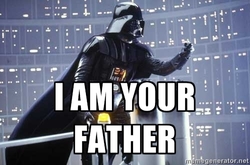I am your father
 Statement 1
: If Darth Vader is Padme's husband, then Padme has a son with Darth Vader, and if Padme has a son with Darth Vader, then Darth Vader is Luke's father.
Statement 1
: If Darth Vader is Padme's husband, then Padme has a son with Darth Vader, and if Padme has a son with Darth Vader, then Darth Vader is Luke's father.
Statement 2 : If Darth Vader is not Luke's father, then Padme doesn't have a son with Darth Vader, and if Padme doesn't have a son with Darth Vader, then Darth Vader is not Padme's husband.
If statement 1 is true, is statement 2 true as well?
Credit: Lucasfilm.
This section requires Javascript.
You are seeing this because something didn't load right. We suggest you, (a) try
refreshing the page, (b) enabling javascript if it is disabled on your browser and,
finally, (c)
loading the
non-javascript version of this page
. We're sorry about the hassle.
Let the statements be denoted as followed:
p = Darth Vader is Padme's husband.
q = Padme has a son with Darth Vader.
r = Darth Vader is Luke's father.
Hence, we can rewrite statment 1 as: ( p → q ) ˄ ( q → r )
Then, the statement 2 can be rewritten as: ( − r → − q ) ˄ ( − q → − p )
Since ( q → r ) = ( − r → − q ) and ( p → q ) = ( − q → − p ), both statements are equivalent. Thus, if statement 1 is true, statement 2 is true as well.